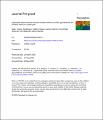Glyphosate-based herbicide has soil-mediated effects on potato glycoalkaloids and oxidative status of a potato pest
Rainio, Miia J., Margus, Aigi, Virtanen, Valtteri, Lindström, Leena, Salminen Juha-Pekka, Saikkonen, Kari, Helander, Marjo. (2020). Glyphosate-based herbicide has soil-mediated effects on potato glycoalkaloids and oxidative status of a potato pest. Chemosphere, 258, Article 127254. https://doi.org/10.1016/j.chemosphere.2020.127254
Julkaistu sarjassa
ChemosphereTekijät
Päivämäärä
2020Oppiaine
Biologisten vuorovaikutusten huippututkimusyksikköEkologia ja evoluutiobiologiaCentre of Excellence in Biological Interactions ResearchEcology and Evolutionary BiologyTekijänoikeudet
© 2020 Elsevier
Glyphosate is the most used herbicide worldwide, targeting physiological pathways in plants. Recent studies have shown that glyphosate can also cause toxic effects in animals. We investigated the glyphosate-based herbicide (GBH)-induced changes in potato (Solanum tuberosum) plant chemistry and the effects of a GBH on the survival rate and oxidative status of the Colorado potato beetle (Leptinotarsa decemlineata). The beetles were reared on potato plants grown in pots containing soil treated with a GBH (Roundup Gold, 450 g/l) or untreated soil (water control). The 2nd instar larvae were introduced to the potato plants and then collected in 2 phases: as 4th instar larvae and as adults. The main glycoalkaloids of the potato plants, α-solanine and α-chaconine, were measured twice during the experiment. The α-solanine was reduced in potato plants grown in GBH-treated soil, which can be detrimental to plant defenses against herbivores. GBH treatment had no effect on the survival rate or body mass of the larvae or the adult beetles. In the larvae, total glutathione (tGSH) concentration and the enzyme activity of catalase (CAT), superoxide dismutase, and glutathione-S-transferase were increased in the GBH treatment group. In the adult beetles, CAT activity and tGSH levels were affected by the interactive effect of GBH treatment and the body mass. To conclude, environmentally relevant concentrations of a GBH can affect the potato plant's glycoalkaloid concentrations, but are not likely to directly affect the survival rate of the Colorado potato beetle, but instead, modify the antioxidant defense of the beetles via diet. ...
...
 ...
...
Julkaisija
ElsevierISSN Hae Julkaisufoorumista
0045-6535Asiasanat
Julkaisu tutkimustietojärjestelmässä
https://converis.jyu.fi/converis/portal/detail/Publication/35930948
Metadata
Näytä kaikki kuvailutiedotKokoelmat
Lisätietoja rahoituksesta
This study was funded by the Academy of Finland (grant no. 311077 to MH), the Alfred Kordelin Foundation (MR), and the Tiina and Antti Herlin Foundation (MR).Lisenssi
Samankaltainen aineisto
Näytetään aineistoja, joilla on samankaltainen nimeke tai asiasanat.
-
Effects of a glyphosate-based herbicide on survival and oxidative status of a non-target herbivore, the Colorado potato beetle (Leptinotarsa decemlineata)
Rainio, Miia J.; Margus, Aigi; Lehmann, Philipp; Helander, Marjo; Lindström, Leena (Elsevier Inc., 2019)Glyphosate is the globally most used herbicide against a wide range of weeds. Glyphosate has been considered safe to animals as it mainly targets physiological pathways in plants. However, recent toxicological studies have ... -
The effects of short-term glyphosate-based herbicide exposure on insect gene expression profiles
Rainio, Miia J.; Margus, Aigi; Tikka, Santtu; Helander, Marjo; Lindström, Leena (Elsevier, 2023)Glyphosate-based herbicides (GBHs) are the most frequently used herbicides worldwide. The use of GBHs is intended to tackle weeds, but GBHs have been shown to affect the life-history traits and antioxidant defense system ... -
Effects of Roundup® Flex on the development and physiology of the Japanese quail (Coturnix japonica)
Kuosmanen, Venla (2018)Roundup®, jonka vaikuttavana aineena toimii glyfosaatti, on yksi maailmalla eniten käytettyjä kasvien torjunta-aineita. Sen ajatellaan olevan vaaraton eläimille, sillä eläimillä ei esiinny samanlaista metaboliaa kuin ... -
Ecosystem consequences of herbicides : the role of microbiome
Ruuskanen, Suvi; Fuchs, Benjamin; Nissinen, Riitta; Puigbò, Pere; Rainio, Miia; Saikkonen, Kari; Helander, Marjo (Elsevier, 2023)Non-target organisms are globally exposed to herbicides. While many herbicides – for example, glyphosate – were initially considered safe, increasing evidence demonstrates that they have profound effects on ecosystem ... -
Analytical method development for polar pesticides using liquid chromatography
Devitte, Yury (2024)The aim of this master’s thesis was to develop analysis methods for three commonly used and known pesticides, namely glyphosate, glufosinate and aminomethylphosphonic acid (AMPA). Two chromatography techniques were mainly ...
Ellei toisin mainittu, julkisesti saatavilla olevia JYX-metatietoja (poislukien tiivistelmät) saa vapaasti uudelleenkäyttää CC0-lisenssillä.

